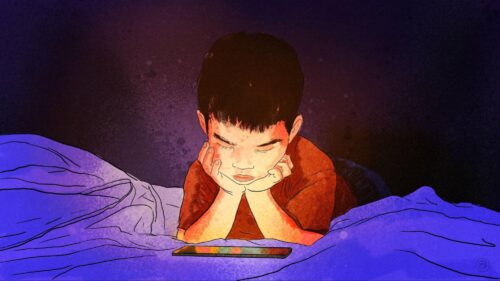‘Crazy Little Yang Brother’ is the Chinese TikTok star you need to know
Famous for his relatable content and over-the-top acting, Zhang Qingyang has become the first creator to reach 100 million followers on Douyin, China’s version of TikTok.

How’s this for an inspiring story? It starts with a prank video filmed in a college dorm, and four years later, it turns into a $13.8 million purchase of a massive office building.
This is a story about humor, persistence, and seizing opportunities in China’s cutthroat creator economy while adapting to opaque rules around expression in the country.
China news, weekly.
Sign up for The China Project’s weekly newsletter, our free roundup of the most important China stories.
The main character: Zhāng Qìngyáng 张庆杨, a 27-year-old man from the eastern Chinese province of Anhui. Posting under the handle “Crazy Little Yang Brother” (疯狂小杨哥 fēngkuáng xiǎo yáng gē) on Douyin, Zhang became the most-followed individual on the short-form video-sharing social platform in March, surpassing Hong Kong acting and singing superstar Andy Lau Tak-wah (刘德华 Liú Déhuá). Last week, Zhang smashed through the ceiling of Douyin users when he became the first person to rack up 100 million followers.
Over the course of nearly four years, Zhang has put out a total of 23 Douyin videos that each have more than 3 million likes, an undeniable accomplishment that puts him way above fellow digital creators on the platform. His livestreaming sessions routinely attract an audience of more than 1 million people, with the most popular one drawing a peak viewership of almost 1.9 million watchers.
Here is how Zhang built his following to become the most popular creator on Douyin.
Making people laugh
Popular influencers on Douyin typically fall into two categories. The first set is made of traditional celebrities who gained fame in real life, such as Chinese mainland actor Chén Hè 陈赫 and Taiwanese star Will Liu Keng-hung (刘耕宏 Liú Gēnghóng). The second group is led by rural influencers like Lǐ Zǐqī 李子柒, who share wholesome content (cooking, foraging, etc.) of pastoral life.
But Zhang belongs to neither group. His earliest videos on Douyin, which date back to 2018, were a mix of him playing pranks on those around him and partaking in viral challenges. Videos that combined both elements often stood out in view numbers, such as one where he lights up an explosive pot of ink and waits for his college roommate to walk in.
In 2019, Zhang began casting his family members in videos of comedy sketches, and that’s when his Douyin account started to really take off. A clip posted in September 2019, which shows Zhang’s older brother ratting on him to their father about his late-night gaming, is his first Douyin video to cross the threshold of 3 million likes.
“This is the beginning of many classics,” a Douyin user commented on the video. Zhang produced more videos that could be grouped under the recurring theme of “young man overcomes every obstacle to play video games.” In one video, Yang’s brother turns off the electric switch at home to stop him from gaming. In another, Yang’s father puts on a pair of outsized boxing gloves, threatening corporal punishment after catching him secretly gaming.
There’s a relatable element to such content, as trying to cope with helicopter parenting seems to be an integral part of growing up in China. For many, these familiar experiences portrayed in Zhang’s videos are cathartic, made all the better because they are presented in a humorous way.
Family-friend content without risk of censorship
Zhang’s following grew rapidly in the first half of 2020 when he went in a new direction. By June, Zhang had entered Douyin’s top echelon with more than 15 million fans. Since then, more characters have appeared in his cleverly written skits, such as his authoritarian mother and hard-faced sister-in-law.
According to Zhang’s followers, the main thing that makes his videos stand out is the family dynamics, which is reminiscent of the dynamics found in successful sitcom series on Chinese television. By making familial relationships his focus, Zhang is able to make his content relatable, regardless of the occupation or social status of the viewer. “Your videos never fail to make me laugh out loud. But after that, I always get emotional thinking about my parents and how important my family is to me,” a Douyin user wrote under one of Zhang’s videos.
Part of Zhang’s success also owes to his knack for sensing where the wind is blowing in China’s creator economy. The shift in Zhang’s content creation, according to some industry observers, was necessary in 2019 when Douyin was under fire for hosting dangerous content after the death of a teenage girl from China’s Shandong Province, who sustained 96% burns and eventually passed away after copying a Douyin user’s video of making popcorn using an aluminum can and an alcohol burner.
Over the years, Chinese internet regulators have ordered short-video-sharing apps like Douyin to carry out multiple cleanup campaigns targeting vulgar or lowbrow content that can potentially have a negative impact on minors.
Even mega influencers aren’t immune to regulatory influences. Last year, after taking a three-month hiatus likely caused by a business dispute, Li Ziqi, who was once named an “ambassador” of Chinese culture by the Communist Youth League, emerged in an interview with state broadcaster CCTV, where she vowed to guide the influencer economy onto a responsible path and spread positive energy as a “socialist farmer.”
Although Zhang’s content is completely apolitical, he seems to be well aware of the scrutiny he’s under. “Our mission is to spread happiness. Everything shown in our videos and livestreaming sessions is for visual effects. Please don’t copy things we do,” his Douyin profile says. Of the three pinned videos on Zhang’s Douyin page, one shows him helping with flood-relief work in Henan in the summer, and another is a speech of him telling parents and their children to stay safe during summer breaks.
What Zhang’s supporters love
Another main reason for Zhang’s success seems to be how he remains the same person and adopts the same sense of humor in whatever he does. This quality is particularly obvious when he tries to sell products during ecommerce livestreams, a common way to leverage and capitalize on one’s social media fame in today’s Chinese influencer economy.
But unlike his peers, who tend to put on a full-on infomercial pitchman persona detached from their real personalities when peddling goods, Zhang is known for giving unfiltered reactions to the things for sale. Such honesty sometimes lands the brands he works with in trouble: In one case, Zhang had to cut a sales segment short after discovering on camera that the apples he was supposed to sell were bruised and overripe.
But fans, who Zhang encourages to ask tough questions about the products during livestreams, see his ecommerce broadcasting as an extension of the “Crazy Little Yang Brother” brand, and they are willing to pay for what they watch. According to industry reports, Zhang has held 76 ecommerce livestreaming sessions in the past six months, which have resulted in the sales of products worth 336 million yuan ($46 million).
Zhang is also looking to expand his brand. Last year, he established his own agency to cultivate talents and hire people to manage his business relationships. In September, he snatched an office building in Hefei that was up for auction, paying over 100 million yuan ($13.8 million) for the space.
But being rich doesn’t seem to be something that matters to him. “I can livestream for hours every day and earn millions. But what’s the point? I would be burnt out and my fans would no longer like me. They would think I’m only doing this for money,” he once said when asked about his brief break from livestreaming earlier this year. “My fans come to me for laughs, and that’s what I should focus on.”






